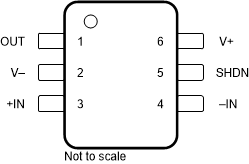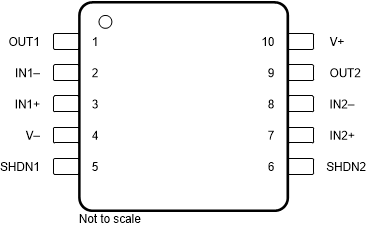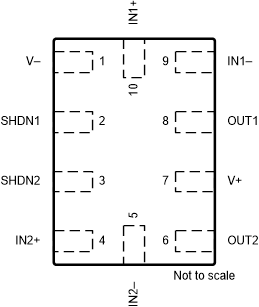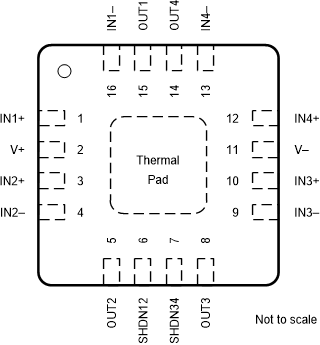SBOS943E February 2019 – August 2021 TLV9101 , TLV9102 , TLV9104
PRODUCTION DATA
- 1 Features
- 2 Applications
- 3 Description
- 4 Revision History
- 5 Pin Configuration and Functions
- 6 Specifications
-
7 Detailed Description
- 7.1 Overview
- 7.2 Functional Block Diagram
- 7.3
Feature Description
- 7.3.1 EMI Rejection
- 7.3.2 Phase Reversal Protection
- 7.3.3 Thermal Protection
- 7.3.4 Capacitive Load and Stability
- 7.3.5 Common-Mode Voltage Range
- 7.3.6 Electrical Overstress
- 7.3.7 Overload Recovery
- 7.3.8 Typical Specifications and Distributions
- 7.3.9 Packages With an Exposed Thermal Pad
- 7.3.10 Shutdown
- 7.4 Device Functional Modes
- 8 Application and Implementation
- 9 Power Supply Recommendations
- 10Layout
- 11Device and Documentation Support
- 12Mechanical, Packaging, and Orderable Information
Package Options
Mechanical Data (Package|Pins)
Thermal pad, mechanical data (Package|Pins)
Orderable Information
5 Pin Configuration and Functions
Figure 5-1 TLV9101 DBV Package
5-Pin SOT-23
Top View
5-Pin SOT-23
Top View
Package is preview
only.
Figure 5-2 TLV9101 DCK and DRL
Package(A)5-Pin SC70 and SOT-553
Top View
Table 5-1 Pin Functions: TLV9101
| PIN | I/O | DESCRIPTION | ||
|---|---|---|---|---|
| NAME | DBV | DCK and DRL | ||
| +IN | 3 | 1 | I | Noninverting input |
| –IN | 4 | 3 | I | Inverting input |
| OUT | 1 | 4 | O | Output |
| V+ | 5 | 5 | — | Positive (highest) power supply |
| V– | 2 | 2 | — | Negative (lowest) power supply |
 Figure 5-3 TLV9101S DBV Package
Figure 5-3 TLV9101S DBV Package6-Pin SOT-23
Top View
Table 5-2 Pin Functions: TLV9101S
| PIN | I/O | DESCRIPTION | |
|---|---|---|---|
| NAME | NO. | ||
| IN+ | 3 | I | Noninverting input |
| IN– | 4 | I | Inverting input |
| OUT | 1 | O | Output |
| SHDN | 5 | I | Shutdown: low = amplifier enabled, high = amplifier disabled. See Section 7.3.10 for more information. |
| V+ | 6 | — | Positive (highest) power supply |
| V– | 2 | — | Negative (lowest) power supply |
Figure 5-4 TLV9102 D, DDF, DGK, and PW Package
8-Pin SOIC, SOT-23, TSSOP, and VSSOP
Top View
8-Pin SOIC, SOT-23, TSSOP, and VSSOP
Top View
Connect thermal pad to V–.
See Section 7.3.9 for more information.
Figure 5-5 TLV9102 DSG Package(A)8-Pin WSON With Exposed Thermal Pad
Top View
Table 5-3 Pin Functions: TLV9102
| PIN | I/O | DESCRIPTION | |
|---|---|---|---|
| NAME | NO. | ||
| IN1+ | 3 | I | Noninverting input, channel 1 |
| IN1– | 2 | I | Inverting input, channel 1 |
| IN2+ | 5 | I | Noninverting input, channel 2 |
| IN2– | 6 | I | Inverting input, channel 2 |
| OUT1 | 1 | O | Output, channel 1 |
| OUT2 | 7 | O | Output, channel 2 |
| V+ | 8 | — | Positive (highest) power supply |
| V– | 4 | — | Negative (lowest) power supply |
 Figure 5-6 TLV9102S DGS Package
Figure 5-6 TLV9102S DGS Package10-Pin VSSOP
Top View
 Figure 5-7 TLV9102S RUG Package
Figure 5-7 TLV9102S RUG Package10-Pin X2QFN
Top View
Table 5-4 Pin Functions: TLV9102S
| PIN | I/O | DESCRIPTION | ||
|---|---|---|---|---|
| NAME | VSSOP | X2QFN | ||
| IN1+ | 3 | 10 | I | Noninverting input, channel 1 |
| IN1– | 2 | 9 | I | Inverting input, channel 1 |
| IN2+ | 7 | 4 | I | Noninverting input, channel 2 |
| IN2– | 8 | 5 | I | Inverting input, channel 2 |
| OUT1 | 1 | 8 | O | Output, channel 1 |
| OUT2 | 9 | 6 | O | Output, channel 2 |
| SHDN1 | 5 | 2 | I | Shutdown, channel 1: low = amplifier enabled, high = amplifier disabled. See Section 7.3.10 for more information. |
| SHDN2 | 6 | 3 | I | Shutdown, channel 2: low = amplifier enabled, high = amplifier disabled. See Section 7.3.10 for more information. |
| V+ | 10 | 7 | — | Positive (highest) power supply |
| V– | 4 | 1 | — | Negative (lowest) power supply |
Figure 5-8 TLV9104 D and PW Package
14-Pin SOIC and TSSOP
Top View
14-Pin SOIC and TSSOP
Top View
Figure 5-10 TLV9104 RUC Package
14-Pin WQFN With Exposed Thermal Pad
Top View
14-Pin WQFN With Exposed Thermal Pad
Top View
Connect thermal pad to V–.
See Section 7.3.9 for more information.
Figure 5-9 TLV9104 RTE Package(A)16-Pin WQFN With Exposed Thermal Pad
Top View
Table 5-5 Pin Functions: TLV9104
| PIN | I/O | DESCRIPTION | |||
|---|---|---|---|---|---|
| NAME | SOIC and TSSOP | WQFN | X2QFN | ||
| IN1+ | 3 | 1 | 2 | I | Noninverting input, channel 1 |
| IN1– | 2 | 16 | 1 | I | Inverting input, channel 1 |
| IN2+ | 5 | 3 | 4 | I | Noninverting input, channel 2 |
| IN2– | 6 | 4 | 5 | I | Inverting input, channel 2 |
| IN3+ | 10 | 10 | 9 | I | Noninverting input, channel 3 |
| IN3– | 9 | 9 | 8 | I | Inverting input, channel 3 |
| IN4+ | 12 | 12 | 11 | I | Noninverting input, channel 4 |
| IN4– | 13 | 13 | 12 | I | Inverting input, channel 4 |
| NC | — | 6, 7 | — | — | Do not connect |
| OUT1 | 1 | 15 | 14 | O | Output, channel 1 |
| OUT2 | 7 | 5 | 6 | O | Output, channel 2 |
| OUT3 | 8 | 8 | 7 | O | Output, channel 3 |
| OUT4 | 14 | 14 | 13 | O | Output, channel 4 |
| V+ | 4 | 2 | 3 | — | Positive (highest) power supply |
| V– | 11 | 11 | 10 | — | Negative (lowest) power supply |

Connect thermal pad to V–. See
Section 7.3.9 for more information.
Figure 5-11 TLV9104S RTE Package(A)16-Pin WQFN With Exposed Thermal Pad
Top View
Table 5-6 Pin Functions: TLV9104S
| PIN | I/O | DESCRIPTION | |
|---|---|---|---|
| NAME | NO. | ||
| IN1+ | 1 | I | Noninverting input, channel 1 |
| IN1– | 16 | I | Inverting input, channel 1 |
| IN2+ | 3 | I | Noninverting input, channel 2 |
| IN2– | 4 | I | Inverting input, channel 2 |
| IN3+ | 10 | I | Noninverting input, channel 3 |
| IN3– | 9 | I | Inverting input, channel 3 |
| IN4+ | 12 | I | Noninverting input, channel 4 |
| IN4– | 13 | I | Inverting input, channel 4 |
| OUT1 | 15 | O | Output, channel 1 |
| OUT2 | 5 | O | Output, channel 2 |
| OUT3 | 8 | O | Output, channel 3 |
| OUT4 | 14 | O | Output, channel 4 |
| SHDN12 | 6 | I | Shutdown, channels 1 and 2: low = amplifiers enabled, high = amplifiers disabled. See Section 7.3.10 for more information. |
| SHDN34 | 7 | I | Shutdown, channels 3 and 4: low = amplifiers enabled, high = amplifiers disabled. See Section 7.3.10 for more information. |
| V+ | 2 | — | Positive (highest) power supply |
| V– | 11 | — | Negative (lowest) power supply |